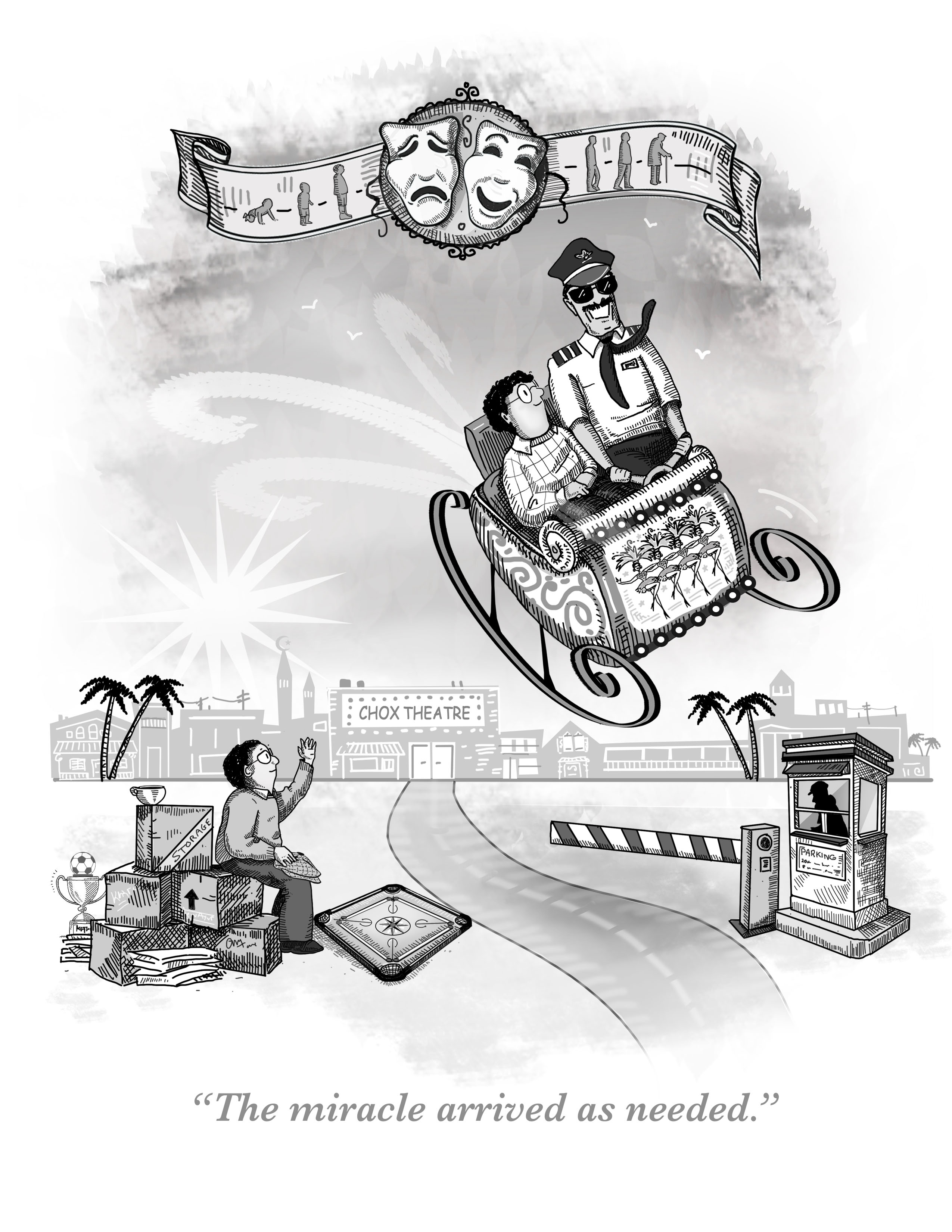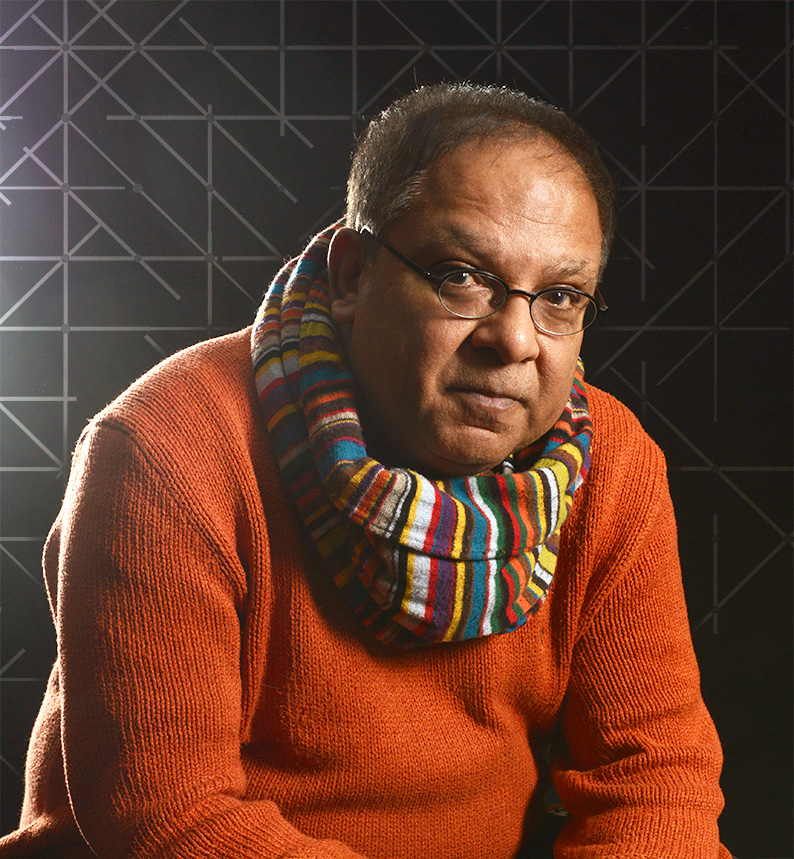December 8th was Dad’s eighty-second birthday. It was also his elder grandson’s seventeenth. Laura cooked steak—Dad’s favorite. He fussed over his birthday cake and insisted on a dozen photos. Dad had mounted old pictures of Alex and framed them with some poetry from Khalil Gibran about children being “not your own, but arrows shot from your bow.”
Yes, Dad was his usual center of attention, yet… glancing at him surreptitiously when Dad wasn’t aware, when his mask slipped for a moment, I could trace worry lines and a distracted frown. The next minute, almost at the snap of a finger, normal service was restored as he returned to his original ebullient self. What were his concerns? Dad never shared his thoughts, speaking only of trivialities.
“Dad, you’ve forgotten to blow out the candles.” Dad had been standing up, about to blow out the two candles in the shapes of 8 and 2. Suddenly, he withdrew into himself, lost to his surroundings.
Christmas was around the corner, and my family was looking forward to The Bahamas. “Dad, why don’t you come with us?”
“No, son. I have to cover for half a dozen staff at my parking lot. Don’t worry, I get double time, lots of tips, and presents from my customers. There’s also a staff Christmas dinner. My friend Alnoor’s on his own too. We’ll hit a movie. Stop being a worrywart. Go enjoy yourself. I’ll see you all when you get back.”
Midmorning the next day, Laura asked, “Has Dad called?”
“No. Why?”
“He left his briefcase here. The one that weighs a ton. Dad carries all his rolled coins for work. I’ve phoned him several times and left messages. He’ll panic. Can you come home at lunchtime and deliver it to him?”
“Sure.”
Dad wasn’t at home. I tried his workplace. Someone new was working at the Eau Claire parking lot. He hadn’t heard of Dad. Perhaps he’d been assigned to another lot. I returned to Dad’s building and persuaded the building manager to take the briefcase and leave it in Dad’s apartment. After that, I didn’t give Dad another thought. I was too busy clearing my workload before leaving for The Bahamas.
On our return from Paradise Island, there were two calls awaiting us.
“This is the CIBC bank manager. Could you please call me? It concerns your father.”
I called back and caught an embarrassed voice at the other end. “Your father listed you as his only kin.”
What had Dad done now?
“We’re not supposed to discuss our client’s affairs with others, but we’re worried about your father. He’s such a lovely man.” What was going on? Alarm bells began to ring. I hadn’t heard from Dad since his birthday. Not even a thank you for his briefcase.
“In the past two weeks, your father’s come in several times to replace his lost debit card. On reviewing his bank account, we noticed he’s making at least a dozen transactions a day, many for only a dollar. Each transaction after the sixth is charged 25 cents. I’ve waived all past and future charges on his account. Is he alright?”
Good question. I thanked the bank manager and returned the second call—from Dad’s building manager.
“Your dad was found sleeping in the elevator. He couldn’t remember his apartment number.”
“But he’s been living there for years.”
“Yes, I know, but still. We’re scared he’s going to be robbed or beaten up. He’s such a lovely man.” If I heard Dad being described as “a lovely man” again, I’d scream. The manager was from Chile. I could sense the man’s unsaid condemnation, as if to say, “Back home, we’d never treat our father that way.”
“I’ve tried to cover up for him, but the tenants have complained. He has until the end of the month to leave. Sorry, I can’t do any more.” The man’s gruff Spanish accent melted in sympathy.
What could I do?
“We have to go find him,” Laura uttered helplessly, beginning to panic.
We convinced the building manager to let us into Dad’s apartment.
Dad had gotten himself a two-bedroom apartment. He had never allowed us in before, giving vague excuses to put us off. The entire apartment—his dining room and living room—were stacked with boxes. There was no room to sleep, except for half of a couch, on which rested two wafer-thin pillows with several blankets laid on top. The thermostat wasn’t working. The gauge remained on max, forcing us to discard our coats and sweaters as we fiddled around trying to reduce the heat. A centimeter of dust lay across every surface. The place smelled of rotting food and Vicks menthol rub.
Boxes piled everywhere were chock-full of old 649 lottery tickets stretching back for years. While living in Toronto, Dad had joined a lottery pool at work. They won a minor prize. Dad’s share was $30,000. To him, it represented a fortune. Since then, Dad’s life mission had been to win a major prize. He must have repaid his winnings in full, with interest. Part of his strategy was to use numbers he gleaned from his meanderings. The car registration numbers from his parking lot, serial numbers from grocery receipts—these were all indexed and filed in date order in one box after another, with lottery application sheets stapled to them.
A mountain of unopened mail lay on the dining table: a demand from Dad’s landlord—he was two months in arrears; a letter of termination from Dad’s employer just before his birthday; phone and cable bills outstanding since November.
“Why didn’t we spot this?” I asked Laura.
“Because you were too busy or irritated to ask him. You never took time to step back and figure things out.” Laura was Dad’s staunchest ally. Dad had quickly accepted her as his own daughter, while others asked, “Why marry a Filipina nanny? Couldn’t you find a nice Muslim girl?” They never took into account that Laura had graduated with two degrees and was working for a major bank before quitting to look after our two boys full-time.
Suddenly, we heard the sound of a key turning in the lock.
“Who are you? What are you doing in my apartment?”
The man was unrecognizable.


